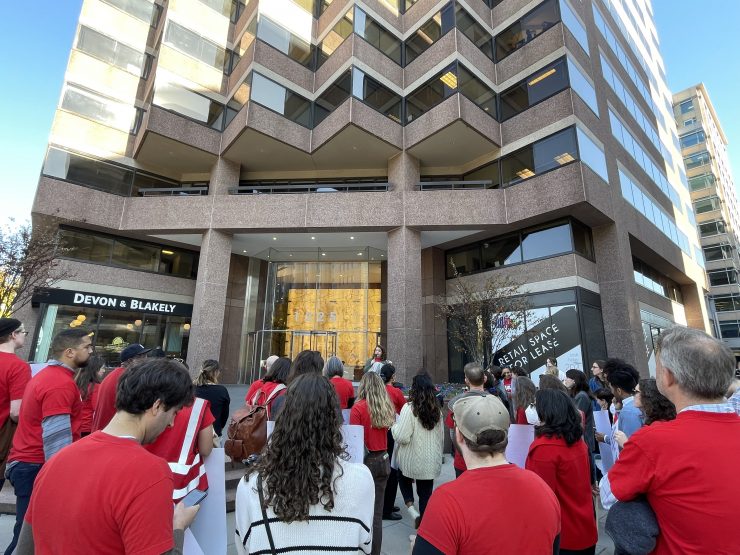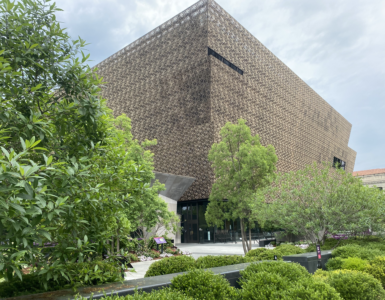Members of the Washington Post Guild picketed outside of the paper’s main office Thursday, demanding higher wages and expanded benefits for employees after the company announced a buyout and contract negotiations stagnated this fall.
Chants of “One, two, three, four, we won’t settle anymore,” and “Hey-hey, ho-ho, no one should be forced to go,” reverberated across K Street as picketing workers rallied in protest, something the organizers said has not occured at the Post in decades.
The union organized the demonstration in response to a buyout proposal from company leadership intended to cut 240 employees from the Post’s workforce. Employees also took issue with the Post’s contract proposals, which the Guild said do not include the wages, retirement packages, or job security provisions workers previously asked for.
“[We are] protesting the buyout offer that we were given, and we’re also demanding that the company continue to negotiate with us over the buyout package, as well as the contract, which has been an ongoing negotiation for months,” said staff writer Daniela Galarza.

Post employees said they grew frustrated with the buyout program because the burden to take the company-offered severance package fell more heavily on a select number of news desks and offices.
The Washington Post Guild Co-Chair Katie Mettler said each department of the Post was offered the package, but the offer came with a caveat: some departments saw a higher “cap” placed on the number of eligible employees than others.
Mettler said departments such as the newsletter, local news, video, audio, copy, and circulation were given a cap of between five and seven employees, implying company leadership expects that number of workers to take the package whether they want to or not. Other departments were given caps of either one or two employees, she said.
The result is a proposal that forces cuts on employees who would prefer to stay at the company and blocks those who may want to leave the company from taking the package, Mettler said.
“With the buyout, specifically, for some people it’s truly voluntary, and that’s what the company has said,” Mettler said. “For those people who feel this is a good deal for them, we want them to take it, but for a lot of people it feels forced or coerced.”
Those who do take the buyout option will receive disproportionate levels of actual take-home compensation based on their age, Mettler said.
The Guild co-chair said the money offered to buyout takers is placed in a secure retirement account (SRA). The money in these accounts is taxed upon withdrawal. Workers who dip into their SRA at a younger age are required to pay higher taxes on the accounts than those who are near retirement age.
A Post story from Oct. 11 reported that the company chose to offer the buyout to employees in response to a steady decline in subscribers and a projected loss of $100 million this year.
But, employees are questioning whether planned cuts to the local news desk is a wise decision for an organization that serves as Washington, D.C.’s local paper.
“I just think that some big-time decisions have already been made about the direction of the business in terms of who gets offered a buyout,” said national reporter Robert Klemko. “From all accounts, it sounds like local news is getting hit the hardest, and I’m not convinced that that’s the way to make the Washington Post profitable.”

In addition to the buyout, employees took issue with the pace and terms of contract negotiations, which Mettler said did not include a salary floor raise for the Post’s lowest-paid employees or a more stringent “just cause” policy meant to protect employees from layoffs without sufficient reasoning.
Mettler said employees also sought mental healthcare benefits to address “secondary trauma” from reporting on emotionally taxing issues.
Despite nearly a year-and-a-half of negotiations, union members and company leadership were unable to reach a contract. Exasperation with company executives grew as buyouts were announced in the midst of contract negotiation, which Mettler said heightened the stakes of pay and employee protection disputes.
“We have been contract bargaining for 17 months, and we were at the tail end of contract bargaining trying to get a deal,” Mettler said. “The company wasn’t really taking us seriously, wasn’t really coming to the table with serious negotiation intent, and then they announced these buyouts.”
The Washington Post could not be reached for comment.















Add comment